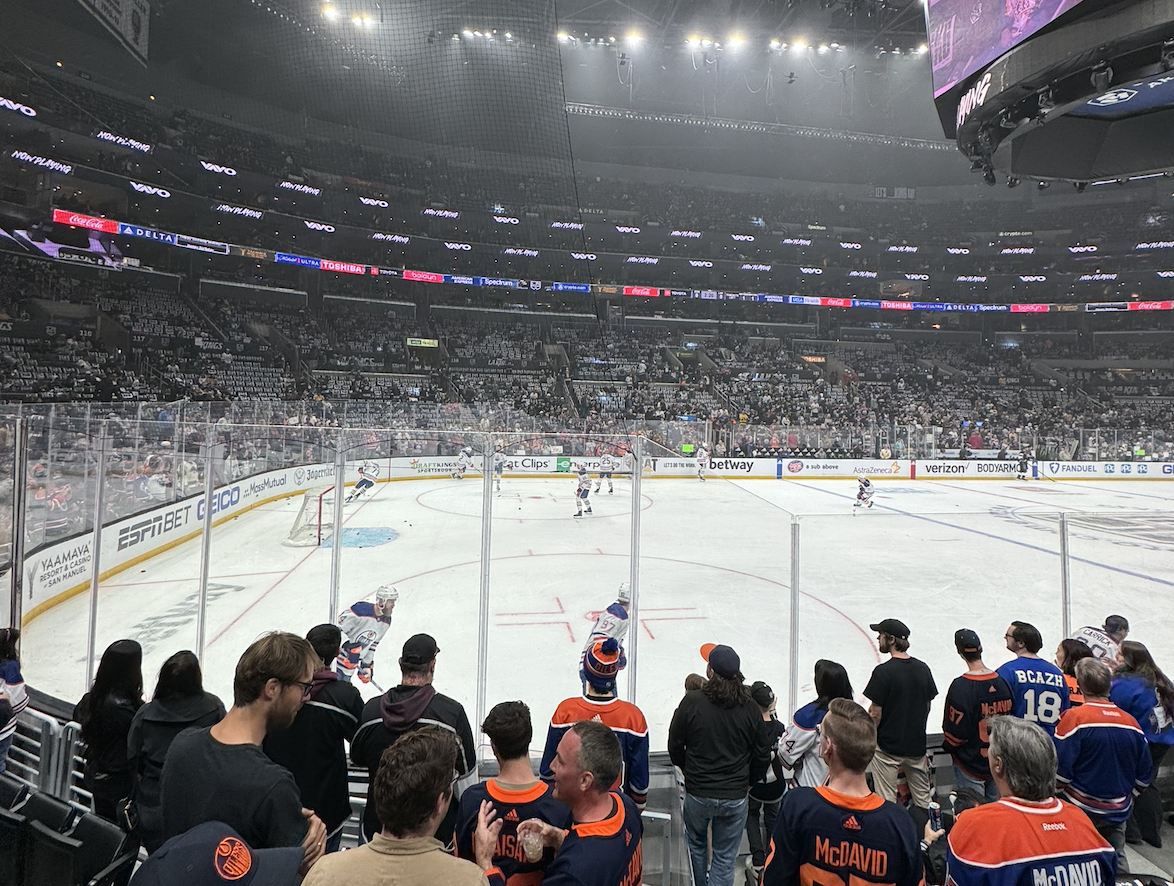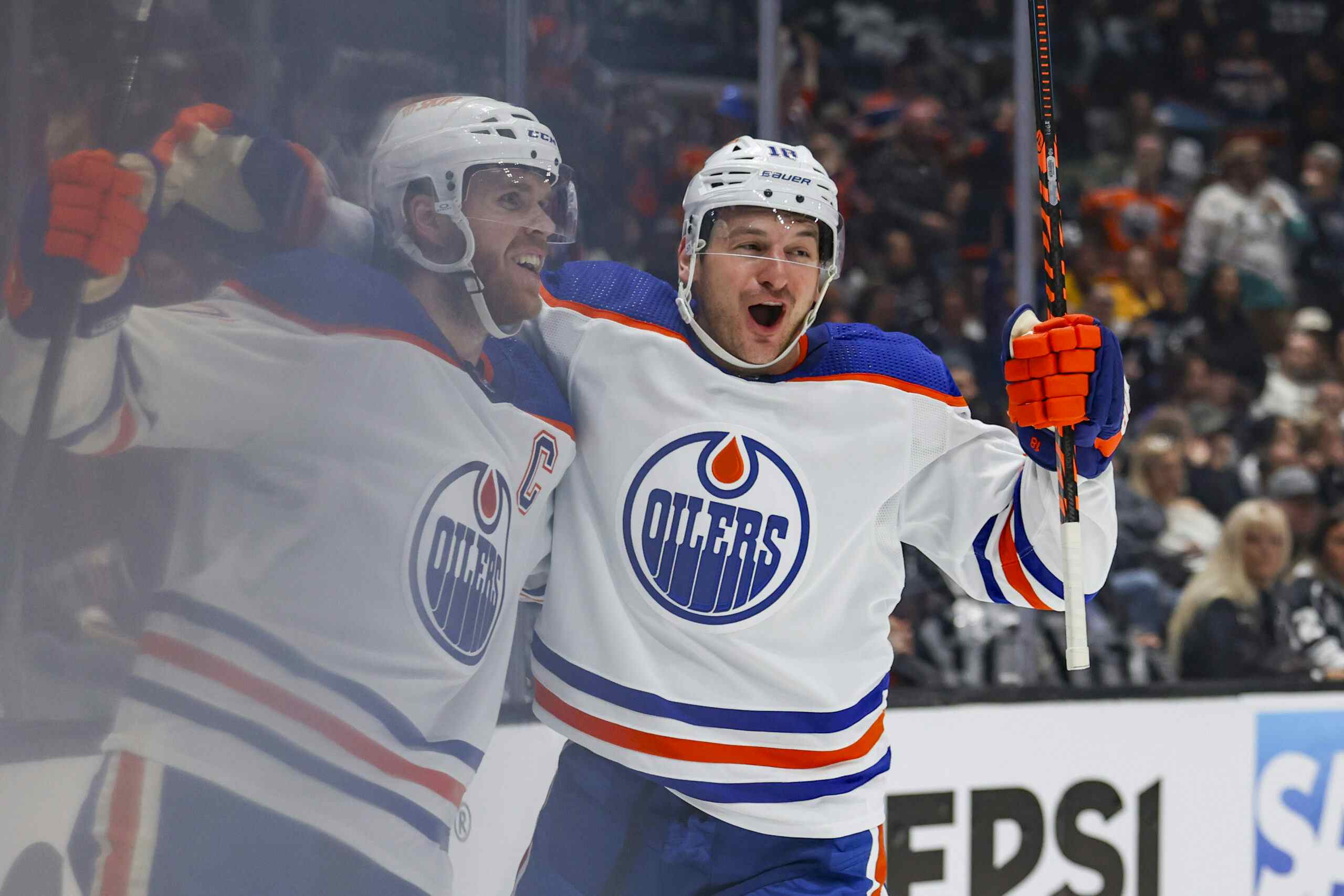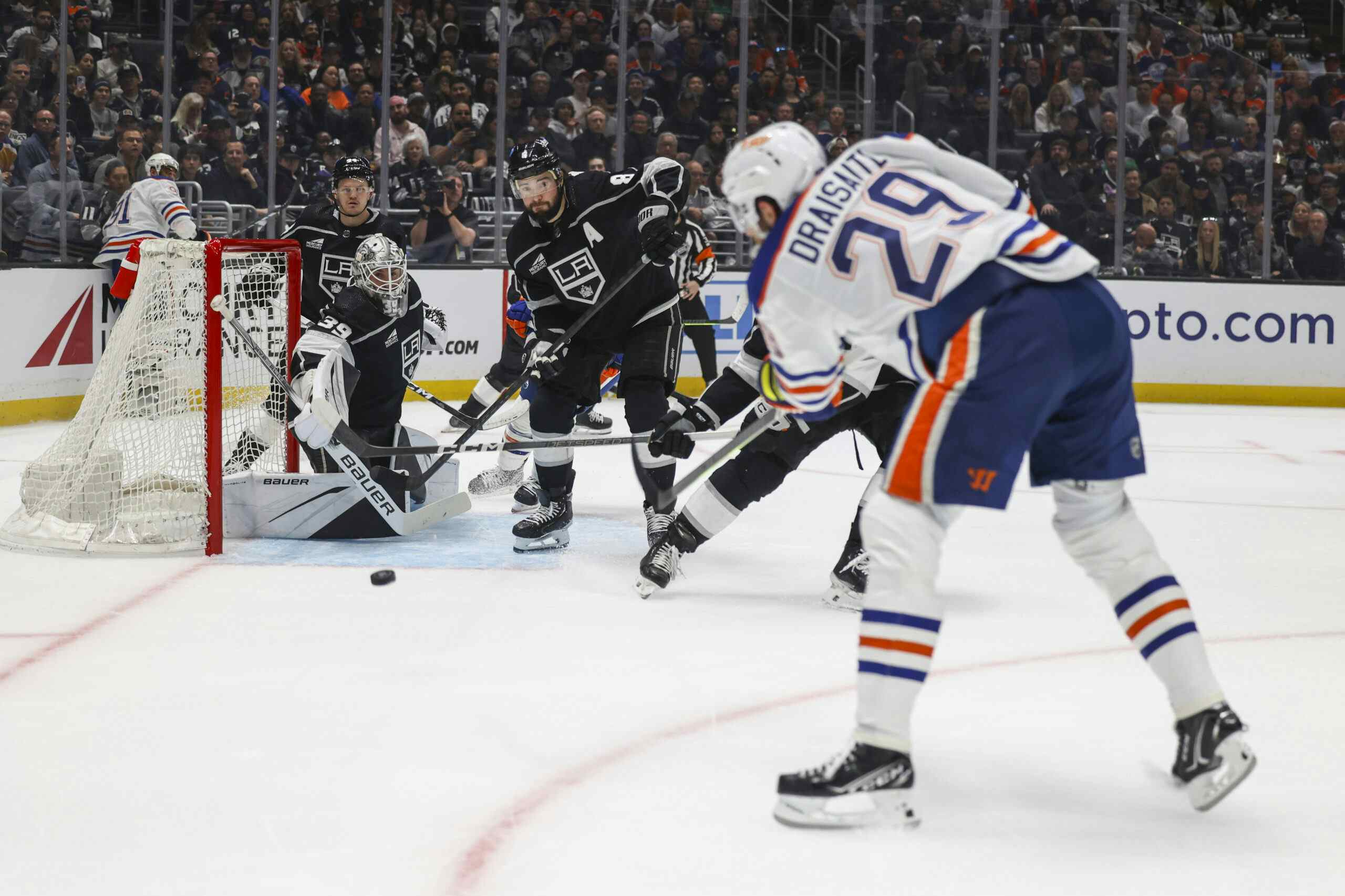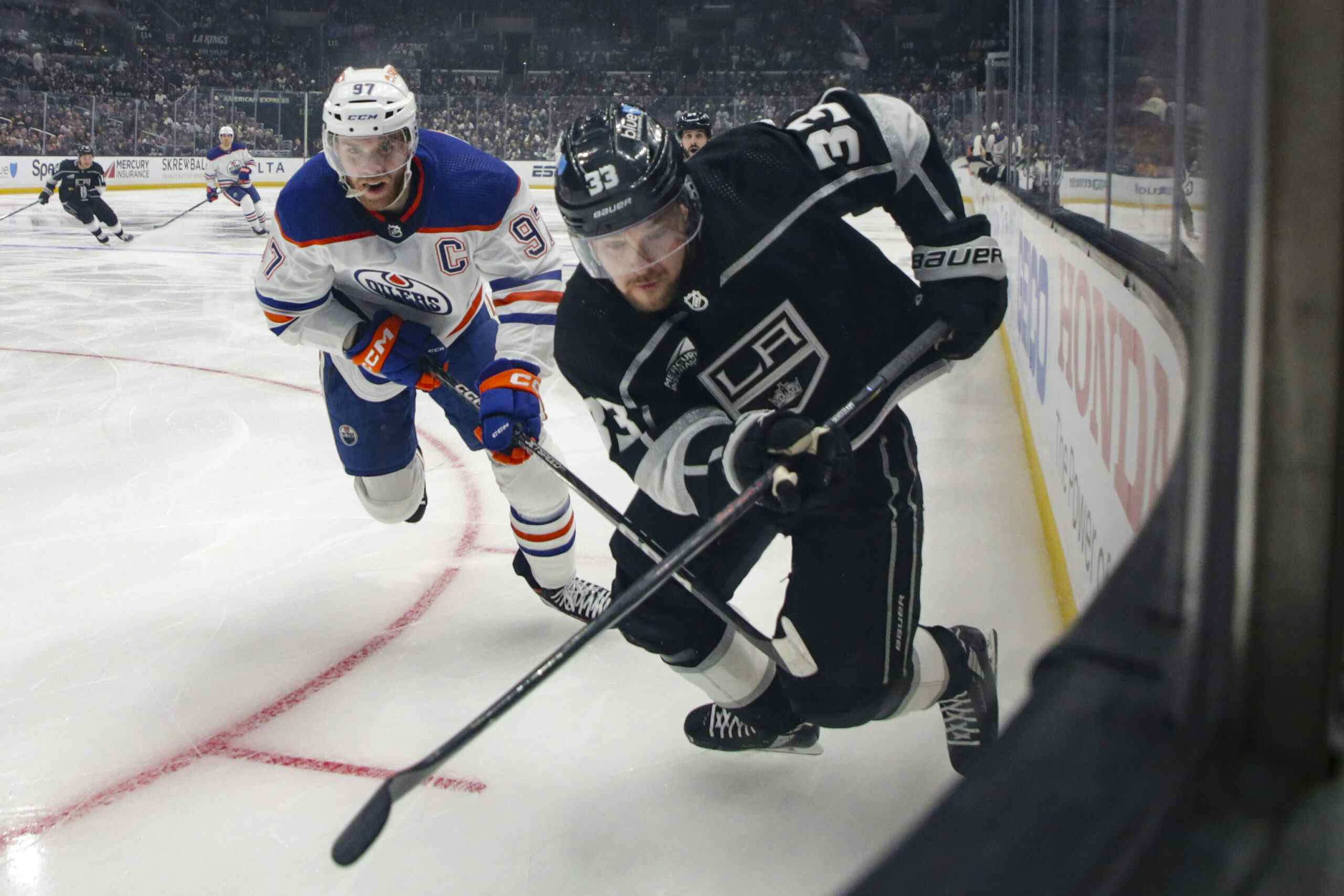THEO PECKHAM: “NEED TO ESTABLISH MYSELF”
By Jason Gregor
11 years ago
In 2011 it looked like Theo Peckham had solidified himself a regular spot on the Oilers blueline. In 71 games he’d scored three goals and 13 points and racked up 198 PIMs, but most importantly he was reliable defensively and physical. When Peckham is on his game, he makes smart, simple plays, kills penalties and is only noticeable when he hits someone.
He was like that in 2011, but last season he wasn’t the same player.
I chatted with Peckham last week about regaining that form, overcoming the fight with Nathan Horton, his conditioning, Ralph Krueger and his love of paintball and cheeseburgers.
Jason Gregor: What was the difference in your game from last year to the previous year, and what do you do to get back to the Theo Peckham of 2010-11?
Jason Gregor: What was the difference in your game from last year to the previous year, and what do you do to get back to the Theo Peckham of 2010-11?
Theo Peckham: There were a couple of things. I got hurt at the end of the year and the type of injury that it was, getting hurt in a fight. Maybe my conditioning could have been better last year and just a lot of things that played into me not having the year that I would have wanted.
JG: Is it more of a confidence thing for you? Where you have to get back your on-ice swagger and confidence?
TP: Oh definitively, it’s such a tough thing to do and that type of injury has only happened to me one time in my career. And mentally it’s a tougher thing to get over with that type of thing always being in the back of your mind. For me, it means getting a good summer of training in and coming in ready and making sure that I kind of lock my job down early.
JG: Did the post concussion symptoms linger longer than you thought?
TP: I don’t think so. It happened towards the end of the year and when I came back, I thought that I was close to 100%. Last year having been hit in the head a couple of times it starts to play with your mind a bit. This summer I took a month off and when I came back I felt good, I felt healthy and I felt ready to go.
JG: Ralph Kruger worked with the defencemen when he was the associate coach, so does he know you a little bit more than the forwards because you worked exclusively with him?
TP: Oh like you said, we worked with him last year and he understands the type of player that I am, and when to push me, and when not. I think that moving forward it’s going to be a good relationship. I understand that he’s the head coach now and it’s his job to come down on me when I’m not doing my job, so that’s a part of it. I’m looking forward to working with him.
JG: Is he that good of a motivator?
TP: Oh yes, for sure. He’s an excellent motivator and an excellent talker and he understands the game very well. He knows how to push the right buttons to get guys fired up.
JG: For you to be successful, you have to play on the edge. You’re stepping up on guys and you’re getting in their face. Is he a coach that understands that if you want to play on the edge every now and then you have to cross it?
TP: Oh yeah, we’ve had a couple of phone calls. I’ve told him that I want a clear understanding of what my role is and I don’t want there to be any miscommunication so that when push comes to shove I know exactly what I’m supposed to do in every situation and there’s no hesitation. And that’s almost death in hockey, when you start hesitating in situations and that can only lead to bad things.
We’ve had a couple of conversations and I’m feeling pretty comfortable coming into this camp with my role on the team and what my job’s going to be.
JG: Can you share with us what his expectations are of you?
TP: Oh I mean, just being a strong, physical, stay at home defenceman who’s going to play well in his own end and is going to step up for his teammates. I mean a lot of the time when you jump in there for a teammate who got hit, you’re going to get the extra penalty. He understands that, and I don’t necessarily have the green light, but he understands that sometimes I might take that extra penalty protecting a teammate, and he wants me to do stand up for guys.
JG: Two years ago you were the guy initiating rather than reacting, you never had a problem stepping up for your teammates, but you could really get the other team off of their game when you’re the guy initiating the contact and then having guys come after you. How do you get back to being that player?
TP: That’s something that I have to get back to and I understand that. It’s even something that I’m working on over the summer.
JG: How do you work on that?
TP: Just getting that confidence level back. And a lot of it has to do with fighting; you know that when push comes to shove that you’re going to be ready to fight. And that ultimately comes down to conditioning and making sure that my body is ready to play an 82-game season.
TRAINING

JG: You’re working out with Norm Lacombe this season and it’s the first time you’re paired up with him. How’s that going?
TP: It’s going, I mean it’s not the easiest thing I’ve done in my life, but it will sure pay off in the end.
JG: You’re doing one on one training instead of in a group of four or five. What’s the benefit to that and do you feel like you’re in better shape?
TP: He’s there the whole time for any questions and he’s pushing me. They’re pretty long sessions and they’re designed specifically for my body type so you’re not doing things that aren’t good for your body so in the long run, it should help out a lot.
JG: Can you give us a quick synopsis of what a workout is with Lacombe?
TP: Well this morning was pretty much we warmed up with some footwork and some explosive power and warm-up took 45 minutes to an hour. And we did about a two hour circuit with weights and treadmill intervals worked into it. It was so long, it’s hard to remember what we did. [Laughs]
The two hour circuit that we did, it was five minutes on the treadmill then a circuit twice, then another five minutes on the treadmill and then you go through the circuit twice. I’m going back and forth until you get it done.
PAINTBALL

JG: You’ve gotten big into paint balling, what is it about this sport that you like so much?
TP: I’m not really too sure, I mean for most people you either love it or you hate it. I’ve been doing it for a while now and this summer I’ve just gotten back into it competitively and it’s been a lot of fun.
JG: When you play competitive paintball, what does that entail? How long does a game of paintball last?
TP: There are a couple of different formats, but the format that we play is called X Ball. It’s a 20 minute clock. The game starts and pretty much once you hit everybody on the other team the game ends. Usually a game lasts two and a half minutes and the game stops. And then a two minute countdown clock starts and when it hits zero a new game begins. You try to play as many points as you can in 20 minutes.
JG: How are your sniper skills? You’re not really a sniper on the ice, are you better in paintball?
TP: I just stand in the back and shoot. [Laughs] I have my games where I’m pretty good, and I have my games where I’m the worst player in the field. [Laughs]
JG: So you play competitively in tournaments for paintball in the summer?
TP: We’ve played three so far, we just finished one for this weekend.
JG: And, how’s your team fairing and what’s your team name?
TP: The Black Hammers. We placed 3rd, 1st and second.
JG: So are you in division one?
TP: No, they break it into 2 divisions; 1 is open for everybody and the other one is divisional for divisional players. In the open division, you can have whoever you want with a maximum of two pros on your team. For the divisional one there’s guidelines for who can play and who can’t.
JG: Is this like a fun workout or is this like a good thing for you to add to your training, or is this just more for fun?
TP: I wouldn’t consider it training, but it’s pretty intense. Anybody who’s every played they know. It’s a little bit of a workout, but it’s more so just an intense and aggressive sport.
NEEDING TO IMPROVE

JG: You talked about how wanting your conditioning to be better next year. What do you need to do to achieve that, and where do you see yourself fitting in on the back end?
TP: Well my role as a defenceman is as a 5/6 guy that’s going to play physical, and get in the other team’s faces and kill penalties. For me, I want to make sure I’m a top-three penalty killer on the team, and just having that trust from the coach that when I’m out there that nothing is going to happen in the defensive zone and I’m counted on to get the puck out every time.
JG: Can you work on improving as a penalty killer? Is there an instincts thing, can you watch tape; how do you become a better penalty killer?
TP: A lot of it has to do with being in lanes, knowing who the shooters are on the ice and more so where they are and just being able to make sure that you are always in their shooting lanes. And a lot of the time you have to go down on one knee and it will hit you anyways, but just putting yourself in the right position to set up for the shot block and then obviously having the guts to sit in front of it. I mean it’s not always the easiest thing to do, but doing it will get your name out there and it’s one of those things that I’ve been kind of good at.
JG: At the end of the year a few players said guys need to know their role and accept the role regardless of what the role is. And you had talked about how you want to know for sure from the coach on what your role is so that you know that going in. Do you think that that was an issue with some of the guys on the team last year, where either their roles weren’t defined or some guys weren’t willing to accept the specific role the coach had laid out?
TP: It’s tough. You want to go out there and be physical and protect your teammates, but you’re not sure if you take a penalty. And it happened a couple of times last year where you would go after a guy, and then they would end up scoring on the penalty or something would happen, and then you get kind of blasted by the coach. So you’re just not too sure what to do anymore.
And in some situations like that, they’re never good and they’re never going to lead to the right outcomes for me. Just knowing that I have the green light to maybe go in and take that 2, 5 and 10 and not possibly be sitting out next game, I think that’s a huge part.
JG: It seems everyone wants an open line of communication, but also know what the consequence is if you don’t follow it.
TP: Well yes, for sure and I mean when the coach outlines what he expects from you, and you’re not willing to do it then you won’t be an Edmonton Oiler. And I understand that, and my role that’s been outlined by Ralph is pretty simple. Every aspect of it, I’m willing to do. All I have to do is to get my body into good enough shape to do it as September.
JG: Were you in better shape in 2010-11 than you were last year?
TP: I don’t think so. I think that I was in pretty much the same shape. I just think that I didn’t maintain it as well as I did in 2010. My body weight went up a little bit and I understand that that was a problem and I’m working to correct that.
JG: You’re naturally a thick guy anyway; you probably have to monitor your diet even more than some of the other guys?
TP: Oh yeah, I mean I really have to watch it. As soon as I start messing around with the potatoes and the pasta, my weight goes through the roof.
EATING RIGHT

JG: When you’re working out with Norm Lacombe, do you have a dietician at all, or is that something that you know enough of on your own?
TP: He works with me a lot. I mean he’ll text me at 6 o’clock just to ask me what am I eating and make sure that I’m not eating anything bad. But for me it’s pretty much just meat and vegetables and I have to stay away from the starches and the carbs.
JG: So if you’re ever eating something that you’re not supposed to, do you tell him?
TP: Oh yeah, it’s got to be a trust thing and the only person that I’m hurting is me. So it doesn’t really matter if I lie to him and ultimately when I step on the scale the next day or something it will show up.
JG: What’s the one thing that’s the hardest thing for you to give up?
TP: I love cheeseburgers. They’re just so good. And that’s what makes it hard. [laughs] I love burgers.
JG: Like a fast food burger, or the one the homemade one?
TP: Just any type of burger, anything. I haven’t had one in the past three and a half weeks and it’s killing me.
JG: So what if you had an open faced burger where you only had the bottom bun, would that be okay?
TP: Well, I mean it would be okay, but ultimately we’re trying to get lighter and faster. And so it would set me back a little bit. It’s up to me to make that decision on what I want to do. I mean Norm’s there and he helps me a lot but ultimately I have to do it.
JG: What’s the number that you guys have looked at and decided would be the best weight for you where you can be strong, physical and have the best cardio?
TP: I think around 230, that’s my goal.
JG: Are you doing yoga, are you doing any of the other things to try to slim down the inches?
TP: I mean ultimately our workouts are geared towards cardio. I don’t do a lot of the heavy lifting. There’s a little bit, but it’s all mixed in with the cardio. So that’s pretty much what we’re going to try to slim down.
THE FRO V. THE FLOW

JG: How’s your golf game this summer?
TP: I’m ready. Jonesy [Ryan Jones] and even Dubey [Devan Dubnyk], we’ve talked about it and maybe get Nuge [Ryan Nugent-Hopkins] in there. I feel like I’m ready, ready to take them on.
JG: You and Jones had a match last year and didn’t he beat you?
TP: He beat me! But apparently the webcast made it look like it was s steam roll, but he beat me by one hole.
JG: Weren’t you leading at one point by 6 strokes?
TP: I think that I was up by 6 holes or something like that and then I just did something stupid, I fell apart.
JG: What happened? Did he start chirping you; can he get you off of your game?
TP: No, you know what; I just started thinking that I was bigger than my clubs. I started hitting drivers when I should have been hitting a 3 wood. And then the next thing you know you’re hitting three off the T box and then I had a couple of questionable calls by the refs. I mean apparently you’re allowed to pull your ball out of the woods and drop it and not get a stroke penalty. That’s the rules apparently.
JG: So you’re suggesting that Jones had the marshal on his side.
TP: Where I come from, if you hit your ball into the woods you have to find it and you have to hit it. And apparently you can move it out of the trees at a no stroke penalty. You know, that happens. Sometimes the refs, they make the tripping call and you just have to deal with it.
JG: It sounds like Jones is playing his own rules because I’m not sure that many guys would allow that.
TP: It wasn’t Jonesy, it was our marshal we had. You couldn’t see it, but I was putting Marshal in quotes. He made the call so it ended up costing me the match.
JG: Do you think that it was because he thought that Jones has better hair?
TP: I have pretty good hair though, it’s small, but it’s good. I mean when I shave it off, obviously, but I can’t get used to that girl look.
JG: Would you have the tight Jheri curls if you grew yours out?
TP: [Laughs] That’s borderline racist, (laughs again) but I don’t really want to talk about that. (deadpans).
JG: No, (laughing) I meant if you grew it out longer?
TP: Well no, it gets curly and big. I tend not to grow it out very much.
JG: So you have a big fro is what you’re telling me?
TP: Well no, (laughs) not really, it just grows straight.
JG: Well, you could have a competition, the “Fro” versus the “Flow.”
TP: Well we could but, it doesn’t look good. There’s not a lot of confidence there. I remember one year I was growing it out, I was half in Springfield, half with the Oilers and I was going to grow it out and cut it off for charity at the end of the year. But when I got called up and one of the assistant coaches told me to get a haircut right away. I did, and I haven’t grown it out since.
WRAP UP
If the Oilers are going to improve they will need every player to improve next season. Peckham understands what he needs to do, and where he fits in. He’ll be a 3rd pairing D-man who can kill penalties and play tough.
If Peckham can rediscover his game from 2011, he will help the Oilers. He’s at his best when he’s playing physical and making the safe, simple play.
Peckham, like many young players, is at crossroad in his career. He will either prove he can be a reliable, everyday defender, or he’ll move to another organization.
The Oilers could really use the former, and I believe he’ll come into camp ready to show them he’s up for the challenge.
Recent articles from Jason Gregor





